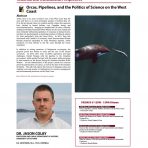Shannon Lecture #1: Orcas, Pipelines, and the Politics of Science on the West Coast with Prof. Jason Colby
Shannon Lecture #1: Orcas, Pipelines, and the Politics of Science on the West Coast with Prof. Jason Colby
Categories: General, Lectures and Seminars, Virtual | Intended for Anyone

Location Details
Please register to receive the zoom link.
Contact Information
History Department, 613-520-2828, history@carleton.ca
Registration
Cost
Free
About this Event
Host Organization: History Department
More Information: Please click here for additional details.
Friday, May 27th, 2022 from 12:00 p.m. – 1:00 p.m.
Abstract:
Today, there is no more evocative icon of the West Coast than the orca, and there is no more prominent product of Alberta than oil. Over the last decade, these two symbols and the values they represent have clashed in heated debates over Canadian energy and environmental policy. Ranging in Canadian and US waters, critically endangered Southern Resident Killer Whales are the most studied and most culturally influential population of cetaceans in human history, and they rely predominantly on declining numbers of Chinook salmon for food, particularly from the Fraser River. In 2013, their fate intersected with Canada’s oil economy, when Houston–based Kinder Morgan proposed expanding its Trans Mountain pipeline, which transports oil from Alberta to the BC coast through the Fraser watershed.
In addition to raising questions of Indigenous sovereignty, the proposal posed new threats to orcas and the rest of the coastal ecosystem. In 2018, after years of public opposition and legal
challenges, Kinder Morgan sold the pipeline to the Canadian government, which pushed forward with the project while promising to fund research on the threats facing the Southern Resident Killer Whales. Yet the federalization of the project raised new concerns about the politicization of science, as well as the fate of the Southern Residents. This talk will explore this history of changing values and clashing icons and ponder its implications for resource management and environmental protection on the West Coast.